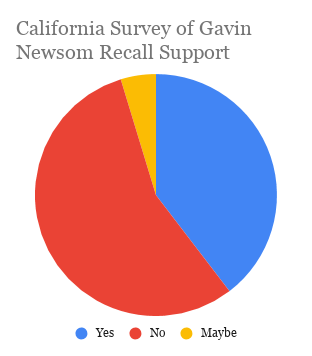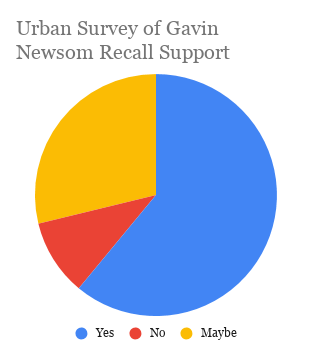Newsom recall election draws mixed reactions
Since stay-at-home orders and lockdown restrictions blanketed California over a year ago, Gavin Newsom, governor of California, has received judgment and criticism for his handling of the pandemic. He is now facing a recall election, a procedure by which voters can remove an elected official from office through a direct vote before their term has ended.
There are a few things that must happen before a recall election can take place. First, organizers must collect signatures equal to 12% of votes cast in the most recent gubernatorial election. In Newsom’s case, at least 1,495,709 signatures were needed, which organizers submitted in mid-March. Next, each county must verify the signatures. Organizers of the Newsom recall effort said they submitted 2,117,730 signatures, leaving much cushion room for void signatures. If enough signatures are verified to hold a recall election, there is a small period of time for voters to withdraw their signatures from the recall position and a period for legislators to discuss the budget, as recall elections are very costly. Finally, the recall election date is set, which is estimated to be between November 15 and December 5 for Newsom.
California voters appear to have mixed feelings about whether to support the recall election. While organizers of the recall effort were able to gather 2.1 million signatures, a vast number of California voters do not support the recall. In late March, the Public Policy Institute of California surveyed almost 2,000 California voters about whether they thought Newsom should be recalled. Only 40% of respondents said they would vote yes on removing Newsom, while 56% of respondents said he should not be recalled and 5% said they were unsure. (The percentages don’t add up to 100% due to rounding.)
Lucas Platter ‘21 agrees with the majority of those surveyed. “I support most of Newsom’s policies, and I think although he has made some errors, I don’t think that’s warranting of recalling him.” Platter is also in the majority at Urban. In a similar survey of 59 members of the Urban community, 61% of respondents said Newsom should not be recalled, 10% said he should be recalled and 29% said maybe.
Zach Gordon ‘24, on the other hand, believes that Newsom should be recalled…with a caveat. “I don’t support the recall if some horrible candidate is running against Gavin Newsom. If there’s someone compelling, then I would support them over Gavin Newsom.” Of the 59 Urban students, faculty and staff surveyed, many of them went through a similar thought process to Gordon’s. However, many of those members put their worry first, ultimately responding that they believed Newsom shouldn’t be recalled because he could be replaced by a much worse candidate. The recall election is open to anyone who would like to run against Newsom, as long as they are a U.S. citizen, haven’t committed any felonies involving the misuse of public money and are a registered voter.
Additionally, many members of the Urban community voiced concerns over who started the effort to recall Newsom. The effort began prior to the COVID-19 pandemic but gained momentum in the last year over Newsom’s handling of the pandemic. “I think by Democrats and liberals supporting this recall, they’re…bordering on giving some legitimacy to some of the minority conservative opinions,” Platter said.
Despite the effort being started by conservatives before the pandemic, Gordon, a moderate Democrat, said, “I think a recall election, when it gets enough signatures, is always a good idea since it gives the voters another chance to have their voice be heard.”



